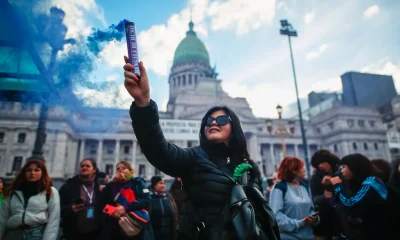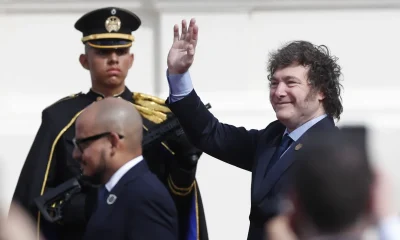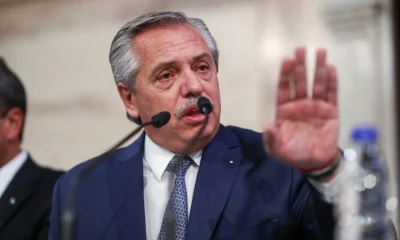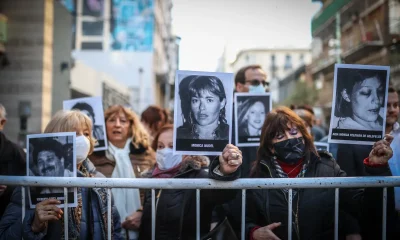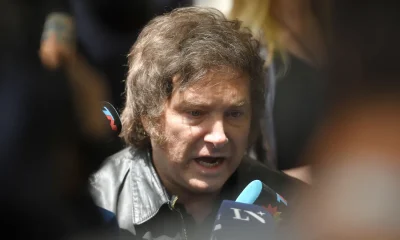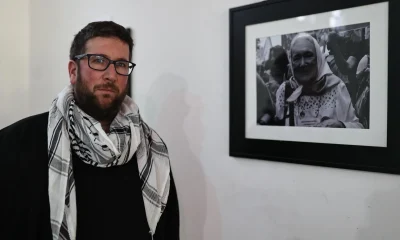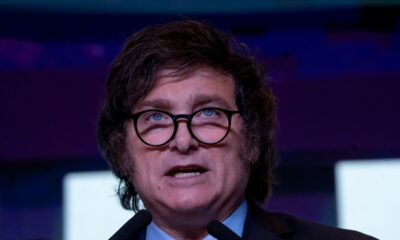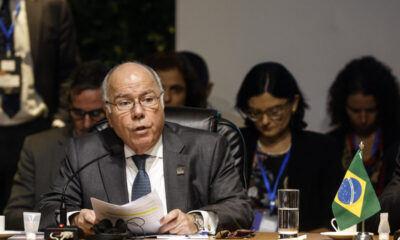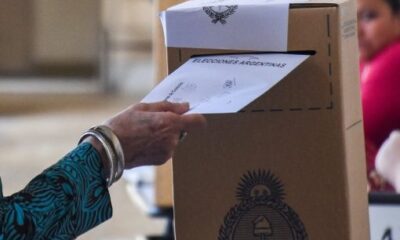International
Milei celebrates 100 days as president, between the controversy and his obstinacy about the course
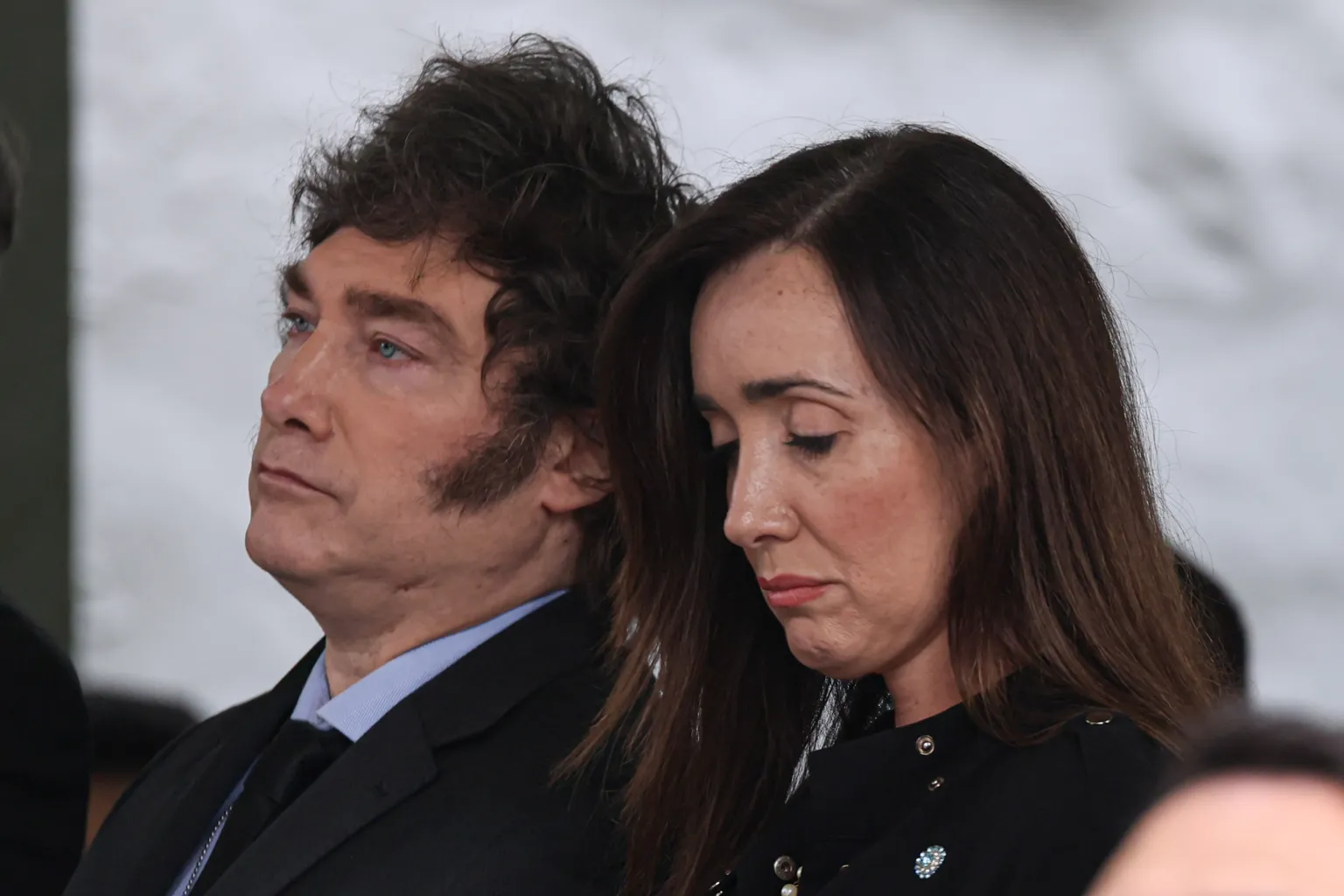
The president of Argentina, Javier Milei, celebrates 100 days of management this Tuesday, in which he has shown obstinacy in the course to achieve fiscal balance and reduce the weight of the State to lower inflation, despite the setbacks in Congress; the fall in purchasing power and criticism for his confrontational method.
In several publications that Milei replied on his social network account X, a direct media that he appreciates a lot, he celebrated that he “avoided the hyperinflation” that was “activated” by his predecessor, the Peronist Alberto Fernández (2019-2023); he began the “sustained process of disinflation” and the decrease in country risk, today at 1,520 basis points.
In terms of security, he replied messages that say that he “ended the pickets” and “he stood against insecurity and narco-terrorism,” and as for corruption, “the amount of illegalities” that he is discovering.
Milei took advantage of this Tuesday to exhibit the unit with her vice president, Victoria Villarruel, on social networks, where they came to publish a photo hugging, after she participated in the meeting of the Cabinet of ministers in the Casa Rosada: “Those who are fighting…!!!,” the president said ironically.
The relationship between Milei and Villarruel reached a peak of tension last week due to the decision of the vice president – who also chairs the Senate – to convene a session in the Upper House where the megadecree of necessity and urgency (DNU) signed by the president in December was rejected.
The presidential spokesman, Manuel Adorni, defined the first 100 days as “a case study” and “an atypical case,” in his usual press conference at the Executive headquarters.
Adorni listed that since Milei took office on December 10, Congress rejected the DNU and a fundamental bill for the Executive, the main union center called for a general strike on January 24 and there were train and bus stops.
In addition, the Patagonian province of Chubut threatened to cut off the supply of hydrocarbons and opposition groups “fantasized” that the far-right would fall for these months.
“This was the only Government (…) that in the first days of the Government has meticulously fulfilled each of the points it had promised in the campaign,” Adorni said, because it “attacked from the outset” the fiscal deficit and clung to the balance of public accounts to “end inflation and the destruction of the currency.”
Milei is an ‘outsider’ who, with aggressive speech and disruptive forms against the “political caste,” won the elections in a second round last November, with 56% support.
“No other government so far had been encouraged to put their hand in politics’s pocket” or “exposed as much to politics” as Milei’s, Adorni said.
Fernández is one of the opposition politicians who criticized the first 100 days of Milei, by showing on his social networks that inflation rose by 71.3%, industrial production fell by 19.4%, retail sales of SMEs fell by 23% and the real salary of registered private workers fell by 27.1%, among other negative indicators.
Amnesty International Argentina warned that the “confrontation” practiced by the Government of Milei is to divert attention from those real conflicts – inflation, poverty, lack of medicines – and violate freedom of expression, and asked for “basic rules of coexistence and non-aggression, especially from the presidential investiture and its collaborators.”
Despite the severe economic adjustment that causes a loss of purchasing power, with inflation that climbed to 276.2% year-on-year last February, Milei maintains a positive image of more than 50%, according to opinion polls.
In that sense, the Government of Milei also boasts of having “changed the concept of governance” because now “it is given by the support of the people,” in a context in which its far-right party, La Libertad Avanza, only has 38 deputies, 7 senators and no provincial governor.
Adorni acknowledged that “there is still a lot to do,” remembering that seven out of ten minors are still poor in Argentina, but that “this time a new sun comes to impoverished Argentina.”
International
Dominican ‘False Hero’ Arrested for Faking Role in Nightclub Collapse That Killed 231

A man identified as Rafael Rosario Mota falsely claimed to have rescued 12 people from the collapse of the Jet Set nightclub in Santo Domingo—a tragedy that left 231 people dead—but he was never at the scene.
Intelligence agents in the Dominican Republic arrested the 32-year-old man for pretending to be a hero who saved lives during the catastrophic incident, authorities announced.
Rosario Mota had been charging for media interviews in which he falsely claimed to have pulled survivors from the rubble after the nightclub’s roof collapsed in the early hours of April 8, during a concert by merengue singer Rubby Pérez, who was among those killed.
“He was never at the scene of the tragedy,” the police stated. The arrest took place just after he finished another interview on a digital platform, where he repeated his fabricated story in exchange for money as part of a “media tour” filled with manipulated information and invented testimonies.
“False hero!” read a message shared on the police force’s Instagram account alongside a short video of the suspect, in which he apologized: “I did it because I was paid. I ask forgiveness from the public and the authorities.”
Central America
Nicaraguan Exiles to Mark 7th Anniversary of 2018 Protests with Global Commemorations

The Nicaraguan opposition in exile announced on Thursday that it will commemorate the seventh anniversary of the April 2018 protests against the government of President Daniel Ortega and his wife, Rosario Murillo, with events in Costa Rica, the United States, and several European countries.
The commemorative activities—which will call for justice for the victims, as well as freedom and democracy for Nicaragua—will include religious services, public forums, cultural fairs, and other public gatherings, according to official announcements.
In April 2018, thousands of Nicaraguans took to the streets to protest controversial reforms to the social security system. The government’s violent response quickly turned the demonstrations into a broader call for the resignation of President Ortega, who is now 79 and has been in power since 2007.
The protests resulted in at least 355 deaths, according to the Inter-American Commission on Human Rights (IACHR), although Nicaraguan organizations claim the toll is as high as 684. Ortega has acknowledged “more than 300” deaths and maintains the unrest was an attempted coup d’état.
International
Arsenal stun Real Madrid at the Bernabéu to reach Champions League semifinals

Arsenal enjoyed a “historic night” on Wednesday after defeating Real Madrid 2-1 at the Santiago Bernabéu, knocking them out of the Champions League quarterfinals, midfielder Declan Rice said.
“It’s such a special night for this club, a historic night for this club,” said Rice, who scored twice in the first leg in London, speaking to TNT Sports.
The English international was named Man of the Match in both legs — the 3-0 win in London and the second leg in Madrid.
“It’s amazing. I knew we were on an upward trajectory and we’ve done incredibly well in this competition. We deserve it and we have full confidence in our coach. Reaching the semifinals is unbelievable,” Rice added.
-

 International5 days ago
International5 days agoNightclub Collapse in Dominican Republic Claims 226 Lives
-
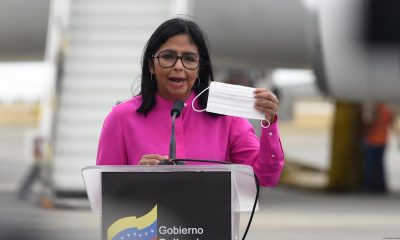
 International5 days ago
International5 days agoVenezuela accuses Guyana of “warlike intentions” after UK defense deal
-

 Central America3 days ago
Central America3 days agoHonduran Police Offer $135K for Tips Leading to the Arrest of Romeo Vásquez
-

 Central America2 days ago
Central America2 days agoPetro questions Ecuador’s vote, cites reports of military control and arrests
-

 International3 days ago
International3 days agoMPV Denounces Electoral Blockade as Secretary-General is Disqualified for May Elections
-

 International1 day ago
International1 day agoArsenal stun Real Madrid at the Bernabéu to reach Champions League semifinals
-

 International3 days ago
International3 days agoMaduro Plans Major Workers’ March on May 1st to Defend Venezuela’s Freedom
-

 International1 day ago
International1 day agoBogotá residents line up for yellow fever vaccine amid national alert
-

 International1 day ago
International1 day agoMexico refuses to restore ties with Ecuador while Noboa remains in office
-

 International1 day ago
International1 day agoDeSantis’ immigration crackdown sparks alarm in Venezuelan Communities in Doral
-

 International2 days ago
International2 days agoColombia: Search continues for missing limb of italian scientist found dismembered
-

 International8 hours ago
International8 hours agoDominican ‘False Hero’ Arrested for Faking Role in Nightclub Collapse That Killed 231
-

 Central America8 hours ago
Central America8 hours agoNicaraguan Exiles to Mark 7th Anniversary of 2018 Protests with Global Commemorations


























